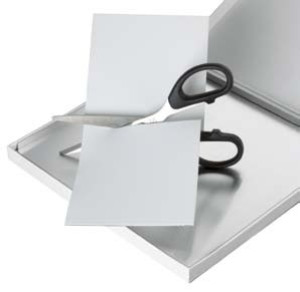EMD Millipore Classical Silica TLC Plates
By EMD Millipore
Silica gel is the most universal adsorbent used in TLC because it covers almost every type of separation by suitable choice of the mobile phase.
EMD Millipore classical silica TLC plates are based on proven EMD Millipore silica gel 60 with a pore diameter of 60 Å, a pore volume of 0.8 mL/g and a specific surface of 520 m2/g (BET). The unique polymeric binder results in a very adherent and hard surface that will not crack or blister and even allows writing with a pencil on the surface without risk of damaging the layer. The smooth and dense plate surface guarantees sharp bands for maximum separation efficiency with lowest background noise, e.g. when performing scanning densitometry.
Classical silica TLC plates have either a layer thickness of 250µm (glass plates) or 200µm (aluminum, plastic plates) and a mean particle size of 10 - 12µm. They are available glass, aluminum or plastic backed in a broad range of different sizes to suit many application needs. The flexible backed aluminum or plastic plates can easily be cut with scissors to match individual separation requirements.
For UV detection of colorless substances, plates with two kinds of fluorescent indicator are available: green fluorescing F254 (manganese activated zinc silicate) or blue fluorescing F254s (magnesium wolframate). In addition, F254s is highly stable in acidic solvent systems. Both indicators fluorescence in UV light at an excitation wavelength of 254 nm. Samples which absorb short-wave UV at 254 nm are detected due to fluorescence quenching. Specially developed high-fluorescence LuxPlates® contain a higher content of fluorescent indicator for further improved identification of separate zones. In addition, the higher amount of binder results in an even more robust and abrasion-resistant surface.
